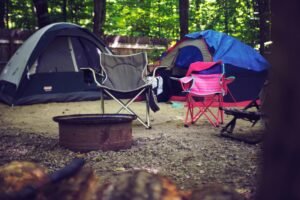Comprehensive Guide of Camping
Overview
Camping is an outdoor recreational activity that involves staying overnight in a temporary shelter, such as a tent, camper, or cabin, in natural environments like forests, mountains, or parks. This hobby allows individuals and families to connect with nature, enjoy fresh air, and escape the hustle and bustle of daily life. Camping can range from primitive experiences with minimal amenities to more luxurious glamping options that include comfortable accommodations and gourmet meals. It promotes physical activity through hiking, fishing, and exploring, while also providing opportunities for relaxation and bonding with friends and family. Camping fosters a sense of adventure and appreciation for the great outdoors, making it a popular choice for many outdoor enthusiasts.
History
The history of camping can be traced back to ancient times when nomadic tribes traveled and lived in temporary shelters as they followed food sources. The modern concept of camping began to take shape in the late 19th century, particularly in the United States and Europe, as people sought to escape urban life and reconnect with nature. The establishment of national parks, such as Yellowstone in 1872, further popularized camping as a recreational activity. The Boy Scouts and Girl Scouts organizations, founded in the early 20th century, also played a significant role in promoting camping skills and outdoor ethics among youth. Over the decades, camping has evolved with advancements in gear and technology, making it more accessible and enjoyable for a wider audience.
Popularity and Demographics
Camping has become an increasingly popular hobby, with millions of people participating each year. According to the Outdoor Industry Association, approximately 48 million Americans went camping in 2020, reflecting a growing interest in outdoor activities, especially during the COVID-19 pandemic. The demographics of campers are diverse, encompassing families, young adults, and retirees. While camping is traditionally associated with families and children, it has gained popularity among millennials and Gen Z, who often seek unique outdoor experiences and share their adventures on social media platforms. Additionally, the rise of eco-tourism and a focus on sustainable practices have encouraged more individuals to explore camping as a way to enjoy nature responsibly.
Sponsored Hobbyists and Vendors
Become a Sponsor!
Affiliate Disclaimer: Throughout some sections below, Hobby Spotlight may suggest some tools, equipment or material using affiliate links. By purchasing any of those items, Hobby Spotlight may earn a small commission. This helps fund our website, content and services without directly charging our users.
Getting Started
Essential Camping Gear:
Beginner
- Tent: Basic camping tent for shelter.
- Sleeping Bag: Lightweight sleeping bag for warmth.
- Camping Stove: Portable stove for cooking meals.
- Flashlight: Handheld flashlight for visibility at night.
- First Aid Kit: Basic first aid supplies for emergencies.
Intermediate
- Camping Chair: Foldable chair for comfort at the campsite.
- Hiking Backpack: Durable backpack for carrying gear on hikes.
- Portable Water Filter: Device for filtering water from natural sources.
- Multi-tool: Versatile tool for various camping tasks.
- Camping Cookware Set: Cookware designed for outdoor cooking.
Basic Requirements and Initial Setup:
- Camping Gear: Essential items include a tent, sleeping bag, and sleeping pad. These provide shelter and comfort during your outdoor stay.
- Cooking Equipment: A portable stove or grill, cooking utensils, and a cooler for food storage are necessary for meal preparation while camping.
- Safety and Navigation Tools: A first aid kit, map, compass, or GPS device are crucial for ensuring safety and navigation in the wilderness.
Fundamental Skills to Learn:
- Setting Up Camp: Learning how to properly pitch a tent and organize your campsite is essential for comfort and safety.
- Fire Building: Mastering the techniques of starting and maintaining a campfire is important for cooking and warmth.
- Outdoor Cooking: Understanding how to prepare meals over a campfire or portable stove enhances the camping experience.
- Navigation Skills: Being able to read maps and use a compass or GPS is vital for exploring and ensuring you don’t get lost.
- Leave No Trace Principles: Learning to minimize your impact on the environment is crucial for preserving nature.
Sub-Hobby/Common Activities:
- Hiking: Exploring trails and enjoying nature while getting exercise.
- Fishing: Engaging in recreational fishing can provide food and relaxation.
- Wildlife Observation: Observing and identifying local wildlife enhances the camping experience.
- Photography: Capturing the beauty of nature through photography is a popular activity among campers.
- Stargazing: Camping in remote areas offers a great opportunity to observe stars and celestial events without light pollution.
Terminology:
- Backpacking: A form of camping where individuals carry their gear in a backpack and hike to their campsite.
- Campsite: A designated area where campers set up their tents and equipment.
- Car Camping: Camping where individuals drive to a campsite and set up near their vehicle.
- Leave No Trace: A set of principles aimed at minimizing human impact on the environment while camping.
- Pitching a Tent: The process of setting up a tent for shelter.
- Trailhead: The starting point of a hiking trail.
- Campfire Ring: A designated area for building a campfire, often made of stones to contain the fire.
- Gear List: A checklist of essential items to bring on a camping trip.
- Wilderness Survival: Skills and techniques used to survive in the wild, including finding food and shelter.
- Day Hiking: Short hikes that can be completed in a single day, often returning to the starting point.
Advanced Topics and Specializations
Advanced Tools and Equipment:
- High-Performance Tent: A lightweight, durable tent designed for extreme weather conditions, featuring advanced materials and easy setup.
- Portable Solar Generator: A compact solar generator that provides reliable power for camping equipment, with multiple output options.
- Multi-Tool with Survival Features: A versatile multi-tool that includes a knife, pliers, screwdrivers, and additional survival tools for outdoor emergencies.
- High-Quality Sleeping Bag: An insulated sleeping bag rated for low temperatures, designed for comfort and warmth during cold nights.
- GPS Navigation Device: A rugged GPS device with topographic maps and route planning features, ideal for navigating remote camping areas.
Advanced Projects and Achievements:
- Backcountry Camping Expedition: Successfully planning and executing a multi-day backcountry trip, including navigation, shelter building, and food sourcing.
- Leave No Trace Certification: Completing a course to become certified in Leave No Trace principles, promoting responsible outdoor ethics.
- Wilderness Survival Skills: Mastering essential survival techniques such as fire-making, foraging, and shelter construction in various environments.
Advanced Techniques and Methods:
- Navigation Skills: Utilizing maps, compasses, and GPS devices to navigate through unfamiliar terrains effectively.
- Advanced Cooking Techniques: Employing methods like Dutch oven cooking and foil packet meals to prepare gourmet meals in the wilderness.
- Gear Optimization: Learning to select and pack lightweight, multi-functional gear to enhance mobility and efficiency during trips.
Specializations and Niche Areas:
- Solo Camping: Focusing on the unique challenges and rewards of camping alone, including self-sufficiency and personal reflection.
- Family Camping: Tailoring camping experiences to accommodate families, including kid-friendly activities and safety measures.
- Winter Camping: Specializing in techniques and gear for camping in cold weather, ensuring safety and comfort.
- Eco-Friendly Camping: Emphasizing sustainable practices, such as using biodegradable products and minimizing environmental impact.
- Adventure Camping: Combining camping with activities like rock climbing, kayaking, or mountain biking for an adrenaline-filled experience.
Future Trends and Innovations:
- Increased focus on sustainable camping practices, including eco-friendly gear and waste reduction.
- Growth of technology-enhanced camping experiences, such as smart tents and solar-powered equipment.
- Emergence of glamping (glamorous camping) as a popular alternative, offering comfort and luxury in nature.
- Integration of virtual reality for pre-trip planning and immersive experiences.
- Rise in community-driven camping events and festivals that promote outdoor education and connection.
Technology Integrations:
- Mobile Apps: Utilizing apps for navigation, weather updates, and campsite reviews to enhance the camping experience.
- Portable Solar Chargers: Using solar technology to keep devices charged while off the grid.
- Smart Camping Gear: Incorporating technology into tents, sleeping bags, and cooking equipment for improved functionality.
- Online Camping Communities: Engaging with forums and social media groups to share tips, experiences, and resources.
- Wearable Technology: Using fitness trackers and smartwatches to monitor health and safety during outdoor activities.
Further Learning and Resources
Books:
- The Ultimate Hiker’s Gear Guide by Andrew Skurka: This book provides essential information on gear selection, packing, and planning for beginners looking to start their camping adventures.
- Camping and Woodcraft by George Washington Sears: A classic guide that introduces beginners to the basics of camping, woodcraft, and outdoor skills with practical tips and techniques.
- The Complete Idiot’s Guide to Camping and Hiking by Michael Mouland: An accessible guide that covers everything from choosing the right campsite to safety tips, making it ideal for novices.
- The Ultimate Guide to Wilderness Living by John McPherson and Geri McPherson: This comprehensive book delves into advanced survival skills, including foraging, shelter building, and fire making for seasoned campers.
- The Backpacker’s Field Manual by Rick Curtis: A detailed manual that covers advanced techniques for backpacking, including navigation, cooking, and first aid, suitable for experienced campers.
- Mountaineering: The Freedom of the Hills by The Mountaineers: An authoritative resource on mountaineering that covers advanced skills, safety, and techniques for serious outdoor enthusiasts.
Websites:
- Camping.org, https://www.camping.org – A comprehensive resource for camping enthusiasts, offering tips, gear reviews, and destination guides.
- REI Co-op, https://www.rei.com/c/camping – A leading outdoor retailer providing expert advice, gear recommendations, and camping essentials.
- AllTrails, https://www.alltrails.com – A platform for discovering hiking trails, with user-generated reviews and maps for camping locations.
- Camping and Caravanning Club, https://www.campingandcaravanningclub.co.uk – Offers a wealth of information on campsites, camping tips, and community events.
- Outdoor Project, https://www.outdoorproject.com – A community-driven site featuring articles, guides, and inspiration for outdoor adventures, including camping.
Courses:
- Camping Basics by REI, https://www.rei.com/learn/camping-basics – A free online course covering essential camping skills for beginners.
- Wilderness Survival Skills by Udemy, https://www.udemy.com/course/wilderness-survival-skills/ – An in-depth course on survival techniques in the wild, suitable for all levels.
- Backpacking 101 by The Adventure Junkies, https://www.theadventurejunkies.com/backpacking-101/ – A beginner-friendly guide to backpacking, including gear selection and trip planning.
- Introduction to Camping by Skillshare, https://www.skillshare.com/browse/camping – A collection of classes focusing on various aspects of camping, from setup to cooking.
- Advanced Camping Techniques by Coursera, https://www.coursera.org/learn/advanced-camping-techniques – A course designed for experienced campers looking to enhance their skills and knowledge.
Content Creators and Community
Content Creators:
- Kara and Nate (YouTube): A couple who shares their adventures in camping and travel, providing tips and insights on outdoor experiences.
- The Outdoor Gear Review (YouTube): Focuses on gear reviews and camping tips, helping viewers choose the best equipment for their outdoor adventures.
- REI (YouTube): The outdoor retailer shares expert advice on camping techniques, gear, and outdoor safety through engaging videos.
- Ben and Jess Camping (Instagram): A couple documenting their camping trips, sharing stunning photography and practical tips for fellow campers.
- Outdoor Adventure (YouTube): Offers a variety of camping tutorials, from setting up tents to cooking in the wild, aimed at beginners and seasoned campers alike.
- Camping with the Kids (TikTok): Shares fun and educational camping experiences for families, focusing on kid-friendly activities and safety tips.
- Van Life (Facebook): A community dedicated to van camping, sharing tips, stories, and resources for those interested in the van life lifestyle.
Online Forums and Social Media Groups:
- Reddit – /r/Camping: A community for sharing camping tips, gear reviews, and personal experiences.
- Facebook Camping Groups: Various groups where camping enthusiasts share advice, photos, and trip planning tips.
- Camping and Hiking (Discord): An interactive community for live discussions about camping gear, locations, and experiences.
- Instagram Hashtags (#camping, #outdooradventures): Follow trending camping photos, tips, and inspiring outdoor experiences.
- Pinterest Boards: Discover a wealth of camping ideas, gear recommendations, and destination inspirations curated by outdoor enthusiasts.
Local Clubs and Organizations:
- Local Outdoor Clubs: Many communities have clubs that organize camping trips and outdoor activities for members.
- Boy Scouts and Girl Scouts: These organizations offer camping experiences and training for youth, promoting outdoor skills and teamwork.
- State Parks and Recreation Departments: Often host camping events and workshops to educate the public about outdoor skills.
- Meetup Groups: Platforms like Meetup.com host local camping clubs and outdoor adventure gatherings.
- Outdoor Education Programs: Many schools and organizations offer programs that teach camping skills and environmental stewardship.
Events, Meetups, and Conventions:
- Outdoor Retailer Expo: A major event showcasing the latest in outdoor gear and camping innovations.
- National Park Service Events: Various events throughout the year that promote camping and outdoor activities in national parks.
- Camping and Outdoor Festivals: Many festivals feature camping demos, workshops, and outdoor activities for all ages.
- Workshops at Outdoor Expos: Learn from experts about camping techniques, gear selection, and outdoor safety.
- Local Camping Competitions: Events that encourage skill development and creative camping setups among participants.
Associated Hobbies
- Hiking: Hiking is a natural companion to camping, allowing enthusiasts to explore trails and enjoy the beauty of nature. Many campers hike to reach their camping destinations or to discover scenic views nearby.
- Backpacking: Backpacking combines hiking and camping, where individuals carry their gear on their backs and camp overnight in remote locations. This hobby emphasizes self-sufficiency and adventure.
- Photography: Capturing the stunning landscapes and wildlife encountered while camping can become a rewarding hobby. Many campers enjoy documenting their experiences through photography.
- Fishing: Camping near lakes, rivers, or oceans often leads to fishing opportunities. Many campers enjoy casting a line to catch their dinner, making fishing a popular associated hobby.
- Cooking: Cooking outdoors is a unique experience that many campers embrace. Experimenting with campfire recipes and preparing meals in nature can enhance the camping experience.
- Star Gazing: Camping in remote areas often provides clear skies for star gazing. Many campers take the opportunity to learn about constellations and enjoy the beauty of the night sky.
- Wildlife Watching: Camping in natural habitats allows for observing wildlife in their natural environment. Many campers enjoy identifying and photographing various animal species.
- Outdoor Survival Skills: Learning survival skills, such as building shelters, starting fires, and foraging for food, can be an exciting aspect of camping. Many enthusiasts take courses or practice these skills during their trips.
Cost and Budgeting
Initial Investment and Ongoing Costs:
- Initial Investment: The cost to start camping can vary widely based on the type of camping you choose (tent camping, RV camping, etc.). A basic tent setup, including a tent, sleeping bag, and sleeping pad, can cost around $150-$300. For RV camping, initial costs can be significantly higher, with RVs ranging from $5,000 for used models to over $50,000 for new ones.
- Ongoing Costs: Ongoing costs include campsite fees, which can range from $10 to $50 per night depending on the location and amenities. Additional costs may include food, fuel for travel, maintenance for RVs, and gear replacement or upgrades over time.
Budget-Friendly Options:
- Borrowing Gear: If you’re new to camping, consider borrowing gear from friends or family to minimize initial costs.
- Camping in Off-Peak Seasons: Many campgrounds offer lower rates during off-peak seasons, making it more affordable to enjoy camping.
- DIY Gear: For those handy with tools, consider making your own camping gear, such as a DIY fire pit or portable camping table, to save money.
Where to Buy:
- Outdoor Retailers: Stores like REI and Dick’s Sporting Goods offer a wide range of camping gear, often with knowledgeable staff to assist you.
- Big Box Stores: Retailers like Walmart and Target carry camping essentials at competitive prices, making it easy to find budget-friendly options.
- Online Marketplaces: Websites like Amazon and Backcountry provide a vast selection of camping gear, often with user reviews to help you make informed decisions.
Money Making
How to Turn the Hobby into a Profession or Side Hustle:
- Camping Guide: Become a certified camping guide, leading groups on outdoor adventures. You can offer services that include planning itineraries, teaching survival skills, and ensuring safety while exploring nature. This role allows you to share your passion for camping while earning a living.
- Camping Equipment Rental Business: Start a rental service for camping gear such as tents, sleeping bags, and cooking equipment. Many people are interested in camping but may not want to invest in expensive gear they will only use occasionally. By providing rental options, you can cater to this market and generate income.
- Camping Blog or Vlog: Create a blog or YouTube channel dedicated to camping tips, gear reviews, and destination guides. By sharing your experiences and knowledge, you can attract a following and monetize your content through affiliate marketing, sponsorships, and advertising.
- Outdoor Skills Workshops: Offer workshops that teach essential camping skills, such as setting up tents, cooking outdoors, and navigating in the wilderness. These workshops can be held in local parks or online, providing valuable knowledge to beginners and enthusiasts alike.
- Camping Retreats and Events: Organize and host camping retreats or events that focus on specific themes, such as wellness, photography, or family bonding. By creating unique experiences, you can attract participants willing to pay for a memorable outdoor adventure.
Benefits and Enjoyment
Physical, Mental, and Social Benefits:
- Physical Activity: Camping often involves various physical activities such as hiking, setting up tents, and cooking outdoors. These activities promote cardiovascular health, improve strength, and enhance overall fitness levels.
- Mental Relaxation: Spending time in nature can significantly reduce stress and anxiety. The peaceful environment of a campsite allows individuals to disconnect from daily pressures, promoting mental clarity and relaxation.
- Social Connection: Camping is a fantastic way to bond with family and friends. Sharing experiences around the campfire, cooking meals together, and exploring the outdoors fosters strong relationships and creates lasting memories.
Success Stories and Inspirational Examples:
- Bear Grylls: Known for his adventurous spirit, Bear Grylls has inspired millions through his survival shows and books. His passion for camping and the outdoors has led him to explore some of the most remote places on Earth, encouraging others to embrace nature.
- Cheryl Strayed: Author of ‘Wild’, Cheryl Strayed’s journey of self-discovery through hiking the Pacific Crest Trail showcases the transformative power of camping and outdoor adventures. Her story has inspired countless individuals to embark on their own journeys into nature.
- National Park Service Volunteers: Many volunteers dedicate their time to maintaining and preserving national parks, sharing their love for camping and the outdoors. Their efforts not only enhance the camping experience for others but also promote environmental stewardship and conservation.
Ways to Enjoy and Grow in the Hobby:
- Explore New Locations: Challenge yourself to camp in different environments, whether it’s a forest, beach, or mountain. Each location offers unique experiences and opportunities for adventure.
- Learn New Skills: Take the time to learn essential camping skills such as navigation, cooking over a campfire, or setting up different types of tents. These skills will enhance your camping experience and boost your confidence.
- Join a Camping Group: Connecting with a local camping group or community can provide valuable resources, support, and camaraderie. Participating in group outings can also introduce you to new friends and shared experiences.
Challenges and Solutions
Common Challenges Faced by Hobbyists:
- Weather Conditions: Camping enthusiasts often face unpredictable weather, which can affect their plans and comfort levels. Rain, extreme heat, or cold can make camping less enjoyable and even dangerous.
- Equipment and Gear Management: With so much gear required for camping, it can be challenging to keep track of everything and ensure that you have the right equipment for your trip. Forgetting essential items can lead to discomfort or safety issues.
- Finding Suitable Campsites: Not all campsites are created equal, and finding a location that meets your needs (such as amenities, accessibility, and scenery) can be a challenge, especially during peak seasons.
- Wildlife Encounters: Camping in nature means encountering wildlife, which can be both exciting and concerning. Properly managing food and waste is crucial to avoid attracting animals.
Tips for Overcoming These Challenges:
- Check Weather Forecasts: Before heading out, always check the weather forecast for your camping destination. Be prepared for changes by packing appropriate clothing and gear for various conditions.
- Create a Gear Checklist: Develop a comprehensive checklist of all the gear you need for your camping trip. This will help ensure you don’t forget anything essential and can make packing more efficient.
- Research Campsites: Use online resources and apps to find and book campsites that suit your preferences. Reading reviews and checking amenities can help you choose the best location for your needs.
- Practice Wildlife Safety: Store food in bear-proof containers and keep your campsite clean to minimize wildlife encounters. Educate yourself on local wildlife and how to react if you encounter them.
Safety Considerations and Best Practices:
- Always inform someone about your camping plans, including your expected return time, to ensure someone knows your whereabouts.
- Carry a first aid kit and know basic first aid procedures to handle minor injuries or emergencies.
- Stay hydrated and bring enough water or a reliable water purification method to ensure safe drinking water.
- Be aware of your surroundings and familiarize yourself with the area, including potential hazards like cliffs, rivers, or unstable terrain.
- Follow Leave No Trace principles to minimize your impact on the environment, including proper waste disposal and respecting wildlife habitats.
Conclusion and Encouragement
Recap of Key Points:
- Camping is a versatile outdoor activity that allows individuals to connect with nature, offering a break from the hustle and bustle of daily life.
- There are various types of camping, including tent camping, RV camping, and glamping, catering to different preferences and comfort levels.
- Camping promotes physical activity, as it often involves hiking, fishing, and exploring, contributing to overall health and well-being.
- It fosters social connections, whether with family, friends, or fellow campers, creating lasting memories and bonds through shared experiences.
- Camping encourages self-sufficiency and survival skills, as campers learn to set up shelters, cook outdoors, and navigate natural environments.
Encouragement to Start and Enjoy the Hobby:
- Camping is an accessible hobby for everyone, regardless of experience level. Beginners can start with local campgrounds that offer amenities, making it easy to ease into the experience.
- It provides a unique opportunity to disconnect from technology and reconnect with nature, allowing for relaxation and mindfulness in a serene environment.
- Camping can be a budget-friendly vacation option, as it often requires minimal expenses compared to traditional travel, making it an excellent choice for families and individuals alike.
Final Tips and Motivational Thoughts:
- Always prioritize safety by preparing adequately, including checking weather conditions, packing essential gear, and informing someone of your plans.
- Embrace the unpredictability of nature; every camping trip is a chance to learn and adapt, enhancing your skills and appreciation for the outdoors.
- Encourage others to join you in camping adventures, as sharing the experience can deepen relationships and inspire a love for nature in others.

















